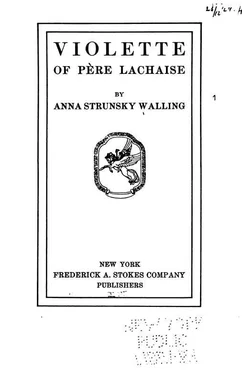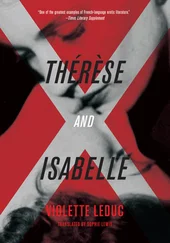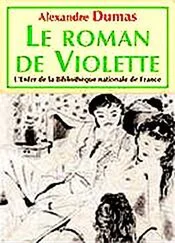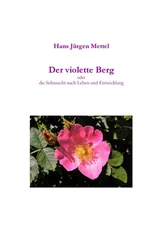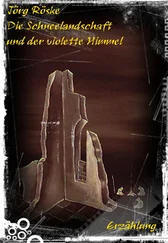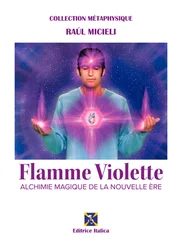Anna Strunsky - Violette of Père Lachaise
Здесь есть возможность читать онлайн «Anna Strunsky - Violette of Père Lachaise» весь текст электронной книги совершенно бесплатно (целиком полную версию без сокращений). В некоторых случаях можно слушать аудио, скачать через торрент в формате fb2 и присутствует краткое содержание. Город: New York, Год выпуска: 1916, Издательство: Frederick A. Stokes Company, Жанр: great_story, на английском языке. Описание произведения, (предисловие) а так же отзывы посетителей доступны на портале библиотеки ЛибКат.
- Название:Violette of Père Lachaise
- Автор:
- Издательство:Frederick A. Stokes Company
- Жанр:
- Год:1916
- Город:New York
- ISBN:нет данных
- Рейтинг книги:4 / 5. Голосов: 1
-
Избранное:Добавить в избранное
- Отзывы:
-
Ваша оценка:
- 80
- 1
- 2
- 3
- 4
- 5
Violette of Père Lachaise: краткое содержание, описание и аннотация
Предлагаем к чтению аннотацию, описание, краткое содержание или предисловие (зависит от того, что написал сам автор книги «Violette of Père Lachaise»). Если вы не нашли необходимую информацию о книге — напишите в комментариях, мы постараемся отыскать её.
Violette of Père Lachaise — читать онлайн бесплатно полную книгу (весь текст) целиком
Ниже представлен текст книги, разбитый по страницам. Система сохранения места последней прочитанной страницы, позволяет с удобством читать онлайн бесплатно книгу «Violette of Père Lachaise», без необходимости каждый раз заново искать на чём Вы остановились. Поставьте закладку, и сможете в любой момент перейти на страницу, на которой закончили чтение.
Интервал:
Закладка:
He had been born among poor people, and he saw life from the angle of privation and misery. The world bore the same aspect to him as to his grandchild, only he was not torn from the breast of his mother, from the arms of his father, he was not left to be reared by the trembling hands of an aged and helpless man, he was not bereft of companionship with his own. He had had brothers and sisters among whom there existed that intense love which only people who suffer in common feel for one another, and this early training in love underlay his fraternity with his kind, his pity for all people and his pride in them. What he felt for his family, the price he saw them pay, in health, in mind, in the sacrifice of talents, in defeat, he felt also for the larger family, called society.
The world was sad, but life led on beyond the world, with its obstructions, its tortures, its grinding of people underfoot. Life whispered what was true and sweet above the noise and confusion. Life held out her hands filled with gifts.
This Violette seemed to say in that voice of hers, every time she addressed him where he sat bent above his work at the table, or standing behind the comiter at the wall, sadly behung with wreaths and crowns, this he read in her beauty every time his eyes rested on her, this he saw in her gestures. He watched her as she slept. Oh, the curly head, the flush on the cheeks, the little hands folded under the perfect chin! He stood over her as milhons of mothers have done since the world began, as fathers have failed to do only to their loss! This child would grow up, and the sun and the stars and the earth would have a hand in her—everything great would contribute to her. Time would carry her aloft through years that she shared with a generation and a universe! She would grow up, and she would never be beautiful and wonderful as she was then. She would grow up to love—a trace of the same smile, the same laughter, the same kiss that more often than not lost itself in mid-air, would be left for her lover. But he would never know what she had been and was not— she would be a little like other people when he came along, but now she was the folded bud of herself, the exquisite beginning of something that life must alter, must to some extent harm. O wonderful baby!
Tears fell on the child over whom he was bending. How had it faded away into mist, that sense of the length of a lifetime that he had had those centuries ago, when he was young I He had slept away his time, dulled by over-work, by worry, his strength sapped by his struggle with the wolves of need that were always pursuing him. So most men live, by living not at all. So they wake up at the end to a sense of beauty and glory, and weep.
What good fortune it was to be awake at all after so long a sleep, to be able to raise the eyes to an expanse of blue, to a loveliness and brightness unequalled by anything he had dreamed of in his youth! For a little while only, but what matters it for how long? He felt beginning in him the desire to live, despite age and illness, at first for her sake, and soon for his own. He was like one who, wandering throughout a night of storm and terror, comes suddenly upon his destination at sunrise.
VIII. Inner Freedom
THE mind of her grandfather fixed itself on her future, leaped ahead in an effort to see her a woman among women and men. It was a habit of his. It might be that the passions gathering in her, like clouds for a storm, the fires of love and of revolt, would break out only to consume her. It might be that she would find no direction or outlet, that she would wander among men and women tortured by a power of second sight, by a clearness of vision, a standard so high as to find herself unable to attach herself to any movement, to undertake for long any task. It might be she would prove a victim of her own strength and her own idealism, would soar and get beyond her goal, would leap forward perilously, following none and being followed by none, would be to the last what she never meant to be, an individual, not merged with the forces of her time.
So much the grandfather, in the nervousness of his love, conceded as possible. No one could foretell what life would do with her. He was certain only that if there were a definite expression of her in some work, that it would of necessity be of a high order, for her work would be herself, the voice of her heart speaking through its hopes and dreams and sorrows, the music of her heart, inspired by her knowledge of life as seen through Pere Lachaise, by her vision of the world gained from drinking of the beauties of the human mind, by her faith in mankind which came straight from the soul of man which she read with the eyes of love. Whatever her effort, it would have to be large and instinct with the spirit of a new world and a new civilisation.
Often he had other thoughts. She was so little, and the years were overtaking him, were rendering him more helpless, more filled with unspoken fears, with a tremulous love that spilled itself in shining tears over her young life. She was so little, and the years ahead held decay for him, but for her the beauty of the rose. He was possessed by a feeling of the sacredness of time, by a passion to hoard every minute left to him. He clamoiued for time, for a respite from death. He demanded it as he would demand a right held from God.
Violette shared his fear. He felt it in her kisses, in the way she clung to him, and he held her in his arms and asked himself if it were not wrong to let a childhood dwell under the shadow of age and death. He looked at her with frightened eyes, pressed close to her and implored Life for life.
He had other fears, too. When he saw how love flowed from her towards everybody in the world, how love flowed towards her. so that not one who entered the shop but lingered to speak with her, he began to see in her as in a mirror the vision of other lives. There had been her mother who was about to be married when her lover had come and talked about spent passion, about feelings that age prematurely, about promises that because they are promises are false from their birth. When he had gone away she walked as in a dream to Pere Lachaise, and sat for many hours there, then staggered home. Later she had found a friend, and they had turned to each other and joined their lives.
There was himself. How he had loved, and yet how easily he had lost the love of the woman he worshipped! But he married. The old man, in his chair facing Pere Lachaise, remembered how he had married to humble his heart, to thwart his destiny I He thought of Therese, Violette's aunt, who did not marry, who laid herself down in death at the end of her twenty-five years—Therese, who loved life like a poet and like a poet knew how to surrender it.
And here was Violette. More than later in her girlhood, more than later still when her whole life stood threatened by love, her grandfather was obsessed by a thousand fears for her. Already in the loving and beloved child he saw the possibly tormented soul of a woman.
He could not say when, in Violette's childhood, he had begun to feel that she was exceptional, that she did not belong to herself or to him at all, but to the whole world; that she had something to offer that the world would be glad of and better for having. Perhaps it began in her infancy, when he heard her name the stars with names taken from the flowers; perhaps it was when he overheard the ditties she crooned to herself at night. Perhaps it was when she was most a child and hurt him with all a child's cruelty, when she envied other children and pictured how they lived in a world all crystal and gold, a world, alas! so different from her own! Perhaps it was when he learned how deep was her need for the mother she had never known, and when he saw how sometimes she turned away from Pere La-chaise as from some monstrous thing.
Читать дальшеИнтервал:
Закладка:
Похожие книги на «Violette of Père Lachaise»
Представляем Вашему вниманию похожие книги на «Violette of Père Lachaise» списком для выбора. Мы отобрали схожую по названию и смыслу литературу в надежде предоставить читателям больше вариантов отыскать новые, интересные, ещё непрочитанные произведения.
Обсуждение, отзывы о книге «Violette of Père Lachaise» и просто собственные мнения читателей. Оставьте ваши комментарии, напишите, что Вы думаете о произведении, его смысле или главных героях. Укажите что конкретно понравилось, а что нет, и почему Вы так считаете.
